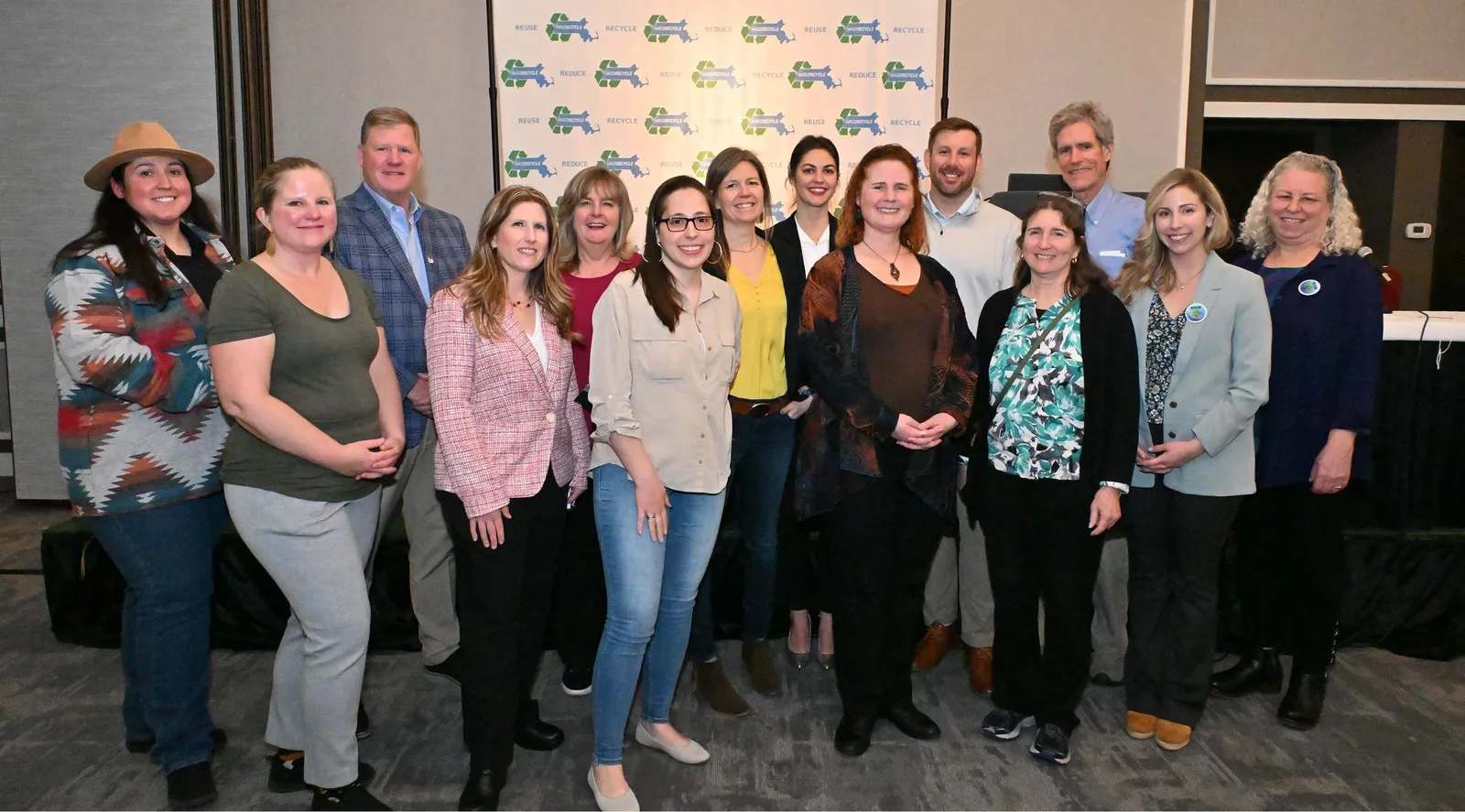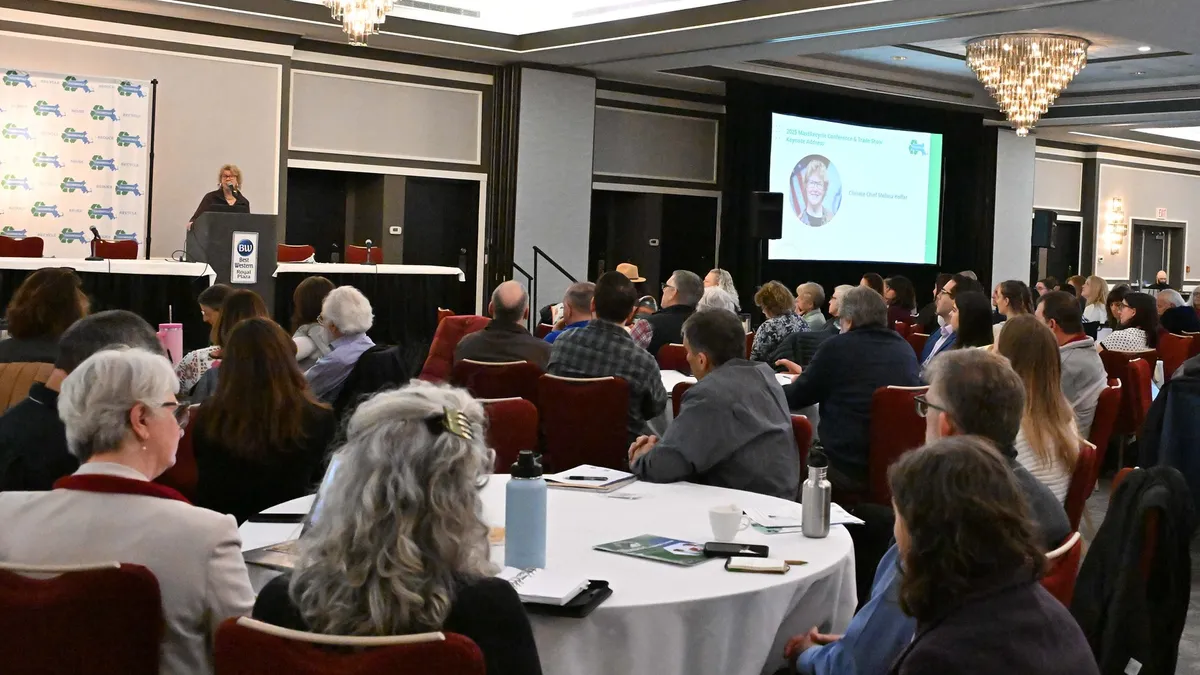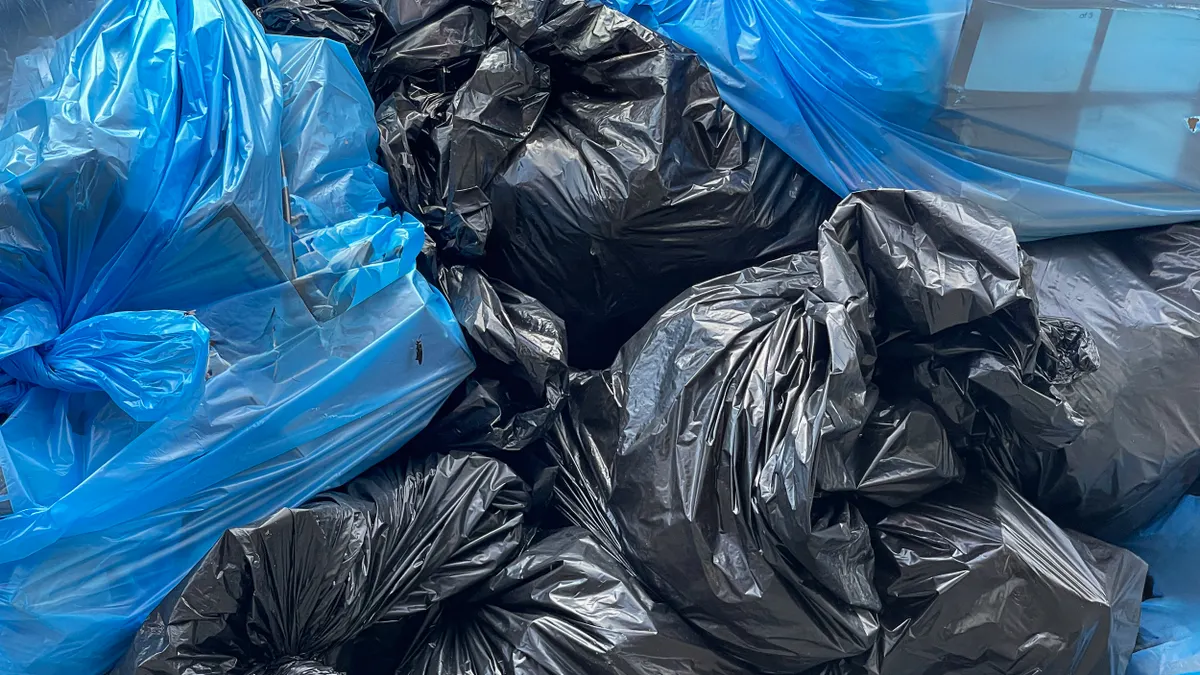Massachusetts, increasingly known for its national leadership on climate action, is viewed as behind on waste and recycling policy. The annual MassRecycle conference featured numerous ideas about how to align these efforts.
This included the debut of a white paper from nonprofit MassRecycle with more than a dozen recommendations about how to reduce greenhouse gas emissions related to goods consumption and waste disposal. State officials also shared updates about the role of organics recycling in their climate plans, and others continued to push for extended producer responsibility laws.
“There's a number of issues that we need to work on, including the absence of adequate landfill space, adequate recycling capacity. Those things all have an economic impact on municipalities,” said Melissa Hoffer, the state’s first climate chief, at the March 18 event. "This work is always important, but it is perhaps more important now than ever as we see the rising demands that will be placed on state and local governments in the months and years to come.”
The state’s Department of Environmental Protection has a goal to reduce waste disposal to 4 million tons per year by 2030. A recent progress report found 6.16 million tons were disposed in 2023, up from a baseline of 5.7 million tons in 2018, and an increasing amount of the waste was exported out of state.
“Massachusetts’ remaining landfills and current waste-to-energy plants, simply put, do not meet the current needs and demands that our state requires,” said Patrick El Khoury, vice president of operations at textile recycler CMRK, noting the lack of sufficient progress “despite Massachusetts’ innovative waste bans, ample grants and sweeping public educational campaigns.”
Organics evolution
Massachusetts has a target to achieve net zero GHG emissions by 2050, with interim targets along the way. Organics recycling is seen as a key part of that effort.
MassDEP currently prohibits the disposal of organics for businesses and institutions that generate more than half a ton per week. Hoffer noted that she previously recommended increasing resources for enforcement of that policy.
"The organics ban is a terrific step in the right direction, but we need to do more to expand composting and increase sustainable food management,” she said. “We need to do more in terms of matchmaking ... it needs to be really easy for you to find somebody who wants that waste.”
John Fischer, MassDEP’s branch chief of commercial waste reduction and waste planning, shared that the total amount of organics diverted increased from 190,000 tons in 2016 to 380,000 tons in 2023. Anaerobic digesters now take the majority of this material, with compost volumes declining notably. Programs in municipalities — including drop-off and curbside — accounted for an estimated 21,000 tons in 2023.
“We're going to be continuing to shift our focus to placing more resources and more of our time and effort building programs that collect food waste from residents and small businesses,” said Fischer.
The state’s solid waste master plan, which is set to undergo a midpoint update, raised the possibility of a universal organics disposal ban that would include residential material. Fischer said the agency will first assess processing infrastructure and the cost-effectiveness of existing residential programs, noting that “it's complicated, and we are by no means ready to do that right now.”
Climate policy
MassRecycle’s paper highlighted organics reduction as an important topic, while also calling for greater attention to the role of waste in broader climate policy.
Terri Goldberg, a lead author on the paper, said the state’s current GHG inventory system offers a "truncated and incomplete view” because it only covers direct emissions from in-state landfills and incinerators. This method excludes emissions from exported waste as well as emissions from the full life cycle of the products that are ending up as waste.
The paper advocates for a consumption-based GHG emissions inventory, or CBEI, which also factors in indirect scope 3 emissions.
The U.S. EPA released a CBEI for Northeastern states last fall which found that consumption-based emissions were 40-60% greater than territorial emissions, and it said that manufactured goods accounted for the largest share. MassRecycle also pointed to a state-specific study conducted by the Oregon Department of Environmental Quality in 2021 as another example. Such research has found the increase in consumption-based emissions is offsetting reduction progress in other areas such as transportation.
“If we do not do something to address consumption, we will not be able to reach our greenhouse gas goals,” said Goldberg.
Hoffer said the group’s paper was "very much aligned” with the priorities of Gov. Maura Healey’s administration. She noted that MassDEP is participating in the development of a separate consumption-based GHG inventory for the Northeast “that would quantify emissions from our goods consumed, no matter where those goods are produced.”
Hoffer also highlighted the state’s work on a comprehensive climate action plan (which could incorporate waste reduction ideas), as well an embodied carbon reduction plan and procurement policies that limit single-use plastic purchases.

Recycling and EPR
Despite its historical leadership on recycling efforts, Massachusetts currently is considered behind pace on policy.
Consultant Chaz Miller recalled how the EPA helped fund some of the nation’s first curbside programs in the local communities of Somerville and Marblehead. Decades later, when China’s National Sword policy scrambled recycling markets MassDEP launched its Recycle Smart program in 2018 to standardize acceptance lists and education materials among MRFs.
Janice Paré, waste reduction education and outreach manager at MassDEP, said Recycle Smart is getting increasingly creative with its messaging. This includes targeted marketing in multiple languages, including for communities with higher contamination rates. The agency also requires municipalities to share information from Recycle Smart in order to qualify for certain grants, though some still don’t.
Paré described this work as increasingly important amid public distrust about recycling. MassRecycle has also been working to address the issue by encouraging MRF tours.
“So if it's such a big lie, I'm wondering why we spend so much time and effort to get the word out about recycling? I think the answer we all know is because we're a small state and we have a big capacity issue, and we have really admirable waste diversion goals,” said Paré.
Massachusetts legislators have yet to follow recent regional or national trends when it comes to updating recycling policies. MassRecycle’s paper recommended that legislators pursue updates to the state’s bottle bill, establish postconsumer recycled content requirements, set recyclability labeling standards, ban certain single-use products and pass EPR for multiple product categories, including packaging.
"This is a policy that works and we are seeing it work across the country,” said Waneta Trabet, chair of the Massachusetts Product Stewardship Council, in reference to EPR.
MassPSC, part of MassRecycle, pushed for various types of EPR during the last legislative session. Trabert said battery EPR is the group’s “primary focus” this session. The issue has seen support from waste and recycling trade groups due to a rash of facility fires. A major fire at ReSource Waste Services’ transfer station in Boston was the latest example.
"We anticipate our legislature will take this more seriously because they can literally put out fires,” said Trabert.
MassPSC developed draft language, with support from battery recycling groups and fire chiefs, that legislators introduced this session. Trabert said the group is seeking evidence of battery-related fires throughout the state to make their case.
A broader climate law signed late last year called for the formation of an EPR commission that could also yield suggestions for how to proceed on new policy. The group, organized by MassDEP, holds its first meeting April 14.



















